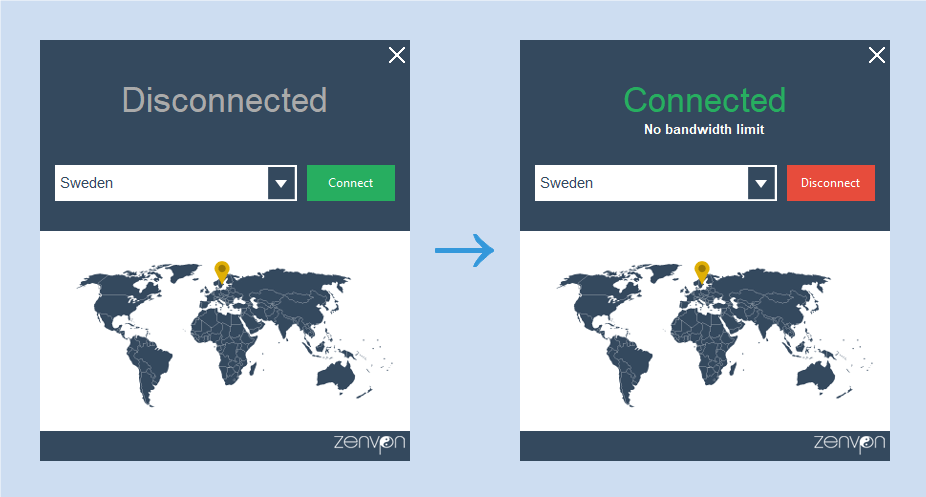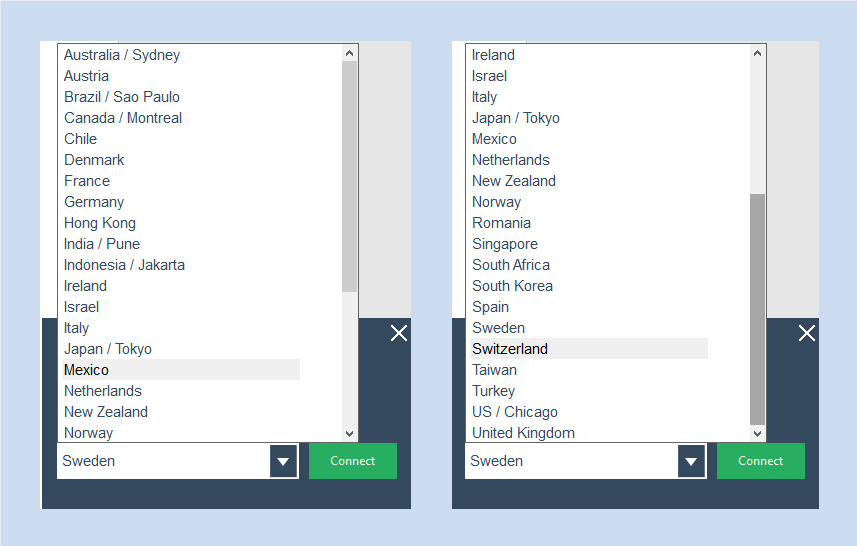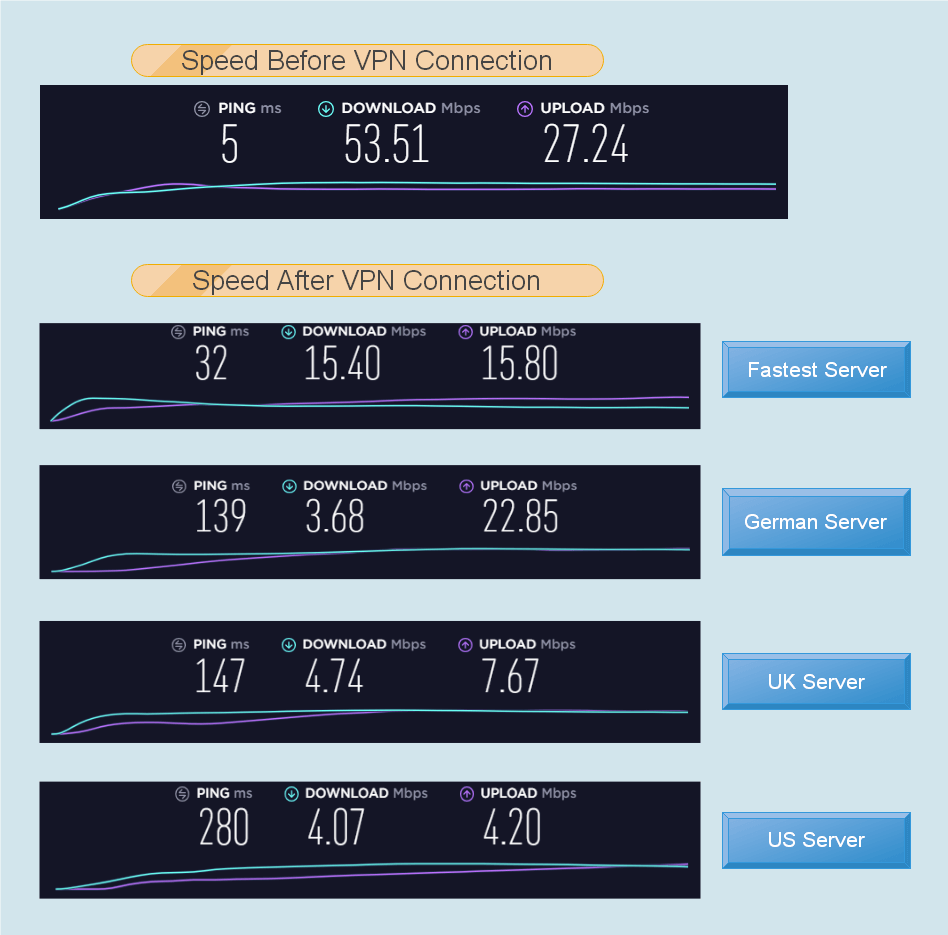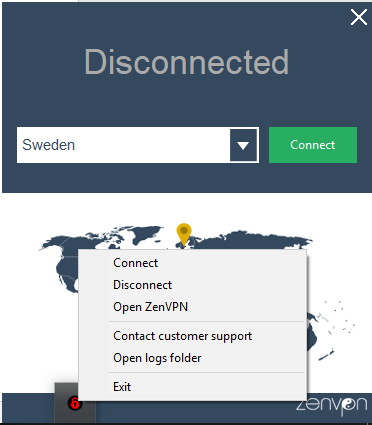Pros

- Jurisdiction: The service comes under the jurisdiction of Cyprus. This island nation is not among the 14-Eyes countries, and the local laws don’t interfere much into the privacy of the users.
- Servers: The service has more than 31 server locations across various countries and continents. The server network gives the user a lot of options when it comes to bypassing geo restrictions.
- Multiple Protocols: The user can choose between OpenVPN, PPTP and L2TP protocols on the service. However, it is not easy to switch between the protocols.
- P2P Allowed: The service provider allows P2P file sharing across all the servers, and users are not supposed to face any issues whatsoever when torrenting on the network.
Cons
- Excessive Logging: Despite the fact that the jurisdiction favors privacy, the service logs the user’s personal data. The major concern can be logging of the IP address of the user.
- Slow Speeds: The speed on the network is very poor. The slow speeds may hamper a lot with the ability of the user to carry on with the usual activities on the internet.
- No IPv6 support: There is no IPv6 support on the service. The potential mismatch in the IP may leak the IP address of the user.
- No kill-switch: The client comes without any kill switch as well. Without the kill switch, there is always a possibility of the leakage of user’s data on the internet without the VPN cover.
Overview

ZenVPN is the property of RubyVector Ltd. The company operates from the island nation of Cyprus.
The nation was once a British dominion but became independent in the year 1960. Cyprus is not a part of the infamous 14-Eyes group.
The local laws help the company to safekeep the user’s personal information.
If you visit the official website of the product, you will see a lot of claims which portray ZenVPN as top-notch service. We are here to put all those claims to the test.
We will see if the service can stand up to the claims. The review will be based on facts and not mere words. There will also be some performance tests involved for sure.
By the end of this review, you will know if ZenVPN is the service which will give you genuine peace of mind.
Servers

Without the servers, there won’t be any network in the VPN service. The importance of the server network can never be emphasized enough. Especially, when the company is catering its services globally.
A vast and spread out server network makes sure that users all around the world get satisfactory connectivity to the network.
The proximity of the user from the server location has a lot to do with the speeds he/she gets on the network. So, it is essential that the user is not too far away from one of the servers in the network.
A good number of servers in the network also reduce the chances of high-density traffic through the servers which affect the performance of the service.
ZenVPN’s server network contains 31 server locations. The number is impressive when compared with a lot of the other VPN services.
The server network is dense in the European continent, which is the case with the majority of the VPN services. But there are enough servers for other regions as well.
They have server locations in North America, South America, Asia, Australia, and Africa as well. The server network makes the service accessible for a large population around the world.
The client, however, has not been appropriately designed to make use of the big server network. There is no server sorting on the client.
All the server locations are available in a long alphabetically ordered list. The servers are not arranged according to the regions or functionality.
Talking of functionality, there are no dedicated servers in the server list as well. P2P file sharing is allowed on all the servers, but the service should have added some preferred servers for tasks such as gaming and streaming.
The client connects to a server location automatically when the app starts. It connected us to the closest server location. In the subsequent sessions, the client will connect the user to the previous server location.
The absence of the optimal server location option can also be annoying for some of the users.
Privacy Policy
The service is based in Cyprus, and as we discussed earlier, the island nation is not a potential roadblock when it comes to safekeeping the privacy of users.
It is not a part of the 14-Eyes countries, and the local laws respect individual privacy.
The service provider claimed that they have a no-logs policy, and given the favorable conditions, we thought that it should not be a problem for them.
But, after going through the logging policy of the service, we found out that it stores way too much than what’s needed.
The company stores the IP address of the user for every session, and this log stays in the system for six long months.
We are unable to think of a reasonable explanation which makes the company store such sensitive information for such a long duration.
They store the IP address of the user when he/she sign-ups on the official website. The timestamps and bandwidth usage are also logged.
The policy of storing the IP address of the user for every session, and that too for six months, does not sound right to us. The service provider should make the necessary changes in the policy and make the service more privacy-friendly.
The service provider also collects the email address of the user and the payment-related information. When the customer uses the mobile application, the service stores the device information as well.
Cookies also come into the picture when the user visits the website of the service. Most of the websites including the ones of the VPN services collect some information when the user visits them.
The data collected by the analytics services is non-personal most of the times, and it is used to improve the service by analyzing customer behavior.
The logging policy of ZenVPN is not satisfactory at all, and the service should reduce logging if the product is to remain relevant in the VPN world.
Connection Time Analysis
| Trial No. | Time to establish a connection (seconds) |
|---|---|
| 1 | 10.04 |
| 2 | 18.79 |
| 3 | 14.63 |
| 4 | 19.6 |
| 5 | 19.77 |
| 6 | 17.3 |
| 7 | 10.15 |
| 8 | 15.23 |
| 9 | 15.36 |
| 10 | 11.29 |
| Avg. Time In Seconds | 15.216 |
The connection time is indicative of the swiftness of the client. If you look at the connection times of many VPN services using the same encryption and protocol, you are more likely to find a whole spectrum of speeds rather than a single connection time.
ZenVPN took 15 seconds on an average to connect to the network. Even though it is just a quarter of the minute, it is not small enough when compared with the times of other VPN services.
A VPN service should not take more than 10 seconds under normal circumstances to establish a connection.
The client of ZenVPN is the simplest one we have come across, and therefore the connection time is not satisfactory at all.
Speed Test

Speed on the VPN service has now become one of those parameters on which the success of the client depends.
Most of the VPN services are beefed up with security features these days, and it is the speed on the network which is separating the men form the boys.
More importantly, the user also does not want to compromise with the speed on the network. Many activities such as online gaming, and high-definition streaming demand high-speed internet connections.
The service provider claimed that the speeds are ‘blazing fast’ on the network, but the results of the speed tests are telling a completely different story.
We connected to the closest server location first, it was also the automatic server choice when we ran the app for the first time. The resultant speed was a measly 28% of the initial speed without the connection.
Right after the first server, we got a clue that there will be some slow-motion performances by the service.
We then connected to a few other servers as well, and the speed kept getting lower and lower. In fact, we got more than 10% of the original speed on none of the servers besides the first one.
The speeds for the German, the UK, and the US servers was only 6.8%, 8.8%, and 7.6% respectively.
The product failed miserably in this section, and the service provider needs to address this issue or else the userbase of the product will also slim down to the small number like the speed on the network.
Security
The fact that users wanted to feel more secure on the internet called for the need for something such as a VPN service.
It is not just the cyber criminals that users want to stay away from, but also the surveillances and monitoring by the governments and the ISPs.
A VPN service is simply not allowed to leave any end untied when it comes to security on the service.
ZenVPN allows the user to choose between three protocols available on the service, that is, OpenVPN, PPTP, and L2TP. But the choice is not as easy as it seems.
The OpenVPN protocol can be used through the client of ZenVPN which can be downloaded for Windows devices.
The users need to take help of the clients of other protocols or manually change the settings to use other protocols. The configuration settings and methods to use all the protocols are available on the official website.
The encryptions available also vary with the protocols. 128-bit encryption is used with OpenVPN and PPTP protocols, whereas 256-bit encryption is used with L2TP protocol.
The encryptions on the service are secure enough, but the user is once again left deprived of the options.
ZenVPN supports IPv4 only, and this can cause an IP leak because of the mismatch. The user can only manually disable IPv6 traffic to stay safe from such a situation.
They use Public DNS servers, which is again not good news, and we recommend the service provider to have their own DNS servers.
Adding to the list of drawbacks, there is no kill-switch on the client as well. A kill switch automatically stops the internet traffic if the internet connection drops. This way it keeps the user’s data safe by not letting it reach the internet without the safety of a VPN.
The service needs to reinforce security measures. They are far too behind the rest of the VPN service when it comes to security.
User Interface and Experience

The user interacts with the service through the user interface. The primary function of the user interface is to give the user some control over the application.
The user interface showcases all the properties and the functions of the application and allows the user to employ them as per his/her convenience.
An intuitive and easy to user interface often make the user stick with the service, and there can be no denying of the fact that it is necessary for the services to have an efficient user interface.
ZenVPN seems to be walking in an entirely different direction though.
The client is available only for the Windows devices. It comes with nothing more than the connection button and the server list.
There are no customization options for the user whatsoever. The service has not got many features in it, and that acted as a catalyst to make the user interface even duller.
We don’t even see any special privilege that the user may get by installing the client. It is just for the sake of changing the server location.
There is absolutely nothing in the user interface for us to describe or explain. However, you can access the logs by right-clicking on the ZenVPN icon.
Platforms and Devices
Let us now discuss the accessibility of this VPN service.
The client of ZenVPN is available only for the Windows. For the rest of the operating systems and platforms, the user needs to take help of proprietary clients of the protocols or manually change the settings in the device.
The client available for Windows can make use of OpenVPN protocol only. To use other protocols on Windows, the user will have to go the manual way.
The service is available for Windows, MacOS, Android, iOS, Linux, Asus RT, and DD-WRT routers.
Browser extensions are absent, and there is no support for devices such as gaming consoles, Smart TVs, etc.
Another drawback of the service is the fact that the user can connect to the VPN through only one device at a time from a single user account.
Simultaneous connections from a single account is not an option on the service. Most of the VPN services offer connectivity through 5 devices simultaneously from a single account.
It seems that ZenVPN made no efforts whatsoever to make the life easy for the user. He/she needs to go through a lot of hassles to switch the device or even the protocol.
So many complications will only repel the user away from the service. The service provider needs to make do corrections and improve accessibility on the service.
Customer Support
Customer support is a vital element of the service when it comes to introducing the user to the product.
Customer support helps the user through the support page, FAQ sections, live chats, and email support.
All these elements can be used by the service provider to familiarize the user to the product and help solve any of the issues that the user may face while using the service.
ZenVPN has no live chat support, and the user can submit query tickets. The ticket gets answered within 24 hours most of the time.
The responses that we got through the tickets were also concise and helpful. The waiting was worth it, and every time the customer service representative handled all our queries professionally.
However, going through the ‘Help’ page on the official website was not that much of a satisfying experience.
There was no discussion on the relevant topics related to the service, and this was the primary reason we had to resort to the query tickets.
The website is full of vague information, and the specification and details can nowhere be seen.
The service provider needs to make the website more informative and give the user a more clear and concrete idea of what the service is all about.
Conclusion
ZenVPN was not even close what we expected or what was promised to us on the website.
There is not even a single section where some massive improvement is not needed. The infrastructure and blue print of the product were promising, but the outcome is not exciting at all.
They need to employ server sorting for their big server list, and some dedicated servers as well. The data collection, as well as the duration for which it is stored, need to be minimized.
Speed on the product needs some immediate attention, and they need to come up with ways to increase the speed of the product manifolds.
The client is virtually useless in its current form and needs a complete transformation. The service provider needs to make sure that it is available for all the supported platforms.
Improvement of the support page on the website will also go a long way in increasing the appeal of the service.
ZenVPN needs to make some substantial improvements before we even consider recommending it to the users.
